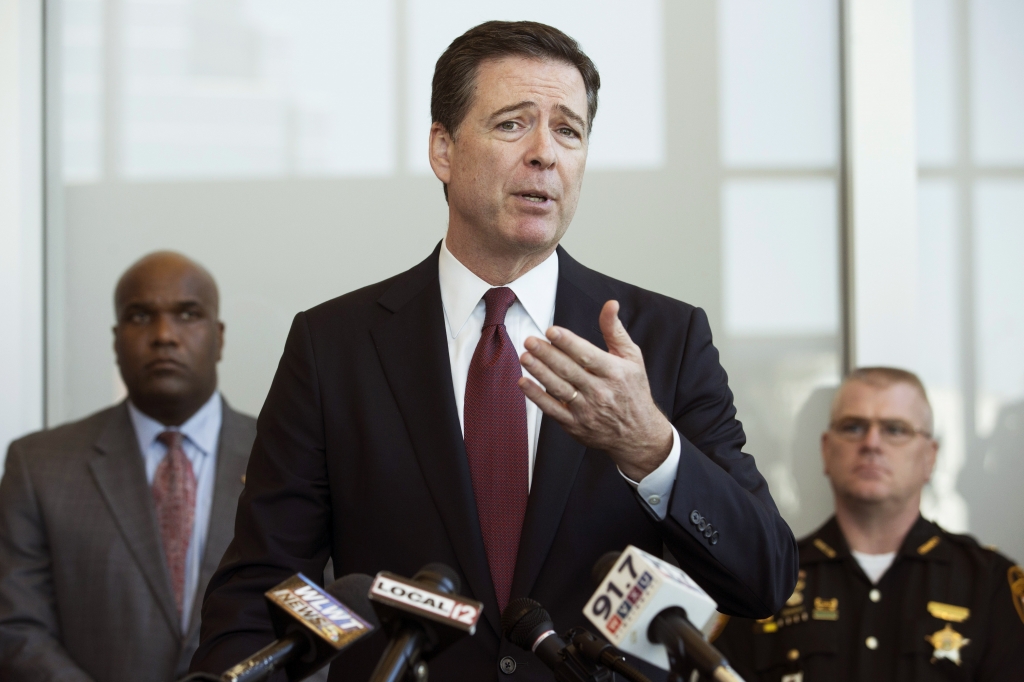-
Tips for becoming a good boxer - November 6, 2020
-
7 expert tips for making your hens night a memorable one - November 6, 2020
-
5 reasons to host your Christmas party on a cruise boat - November 6, 2020
-
What to do when you’re charged with a crime - November 6, 2020
-
Should you get one or multiple dogs? Here’s all you need to know - November 3, 2020
-
A Guide: How to Build Your Very Own Magic Mirror - February 14, 2019
-
Our Top Inspirational Baseball Stars - November 24, 2018
-
Five Tech Tools That Will Help You Turn Your Blog into a Business - November 24, 2018
-
How to Indulge on Vacation without Expanding Your Waist - November 9, 2018
-
5 Strategies for Businesses to Appeal to Today’s Increasingly Mobile-Crazed Customers - November 9, 2018
Federal Bureau of Investigation director partly blames police restraint for violent crimes
Now the director of the Federal Bureau of Investigation, James Comey, believes there is a connection between those demonstrations and the rise in violent crime in America, called the Ferguson Effect. “I will say that the available evidence at this point does not support the notion that law enforcement officers around the country are shying away from fulfilling their responsibilities”.
Advertisement
“On the contrary, I think you’ve seen a lot of local law enforcement leaders indicate that police officers and sheriffs and other local law enforcement officials are actually dedicated public servants who on a daily basis are putting their lives on the line to serve and protect the communities that they’re assigned to”.
Comey also said during his Friday speech that too many public officials have taken to incorrectly describing the disproportionate way that police scrutiny, arrests, convictions and long stretches of jail time have become a part of the black and Latino American experience as “mass incarceration”.
“Part of the explanation is a chill wind that has blown through law enforcement over the past year and that wind is surely changing behavior”, he added.
The problem here is that Comey and those who agree with him would appear to be saying that police officers in a democratic society can not or will not do their actual jobs if and when they are going to be required to themselves abide by the law or face the consequences if evidence exists that they did not. “Of course, each of those hashtags and what they represent adds a voice to an important conversation, but each time someone interprets hashtag Black Lives Matter as anti-law enforcement, one line moves away and each time someone interprets hashtag Police Lives Matter as anti-black, the other line moves away”.
“We need to figure out what’s happening and deal with it now”, Comey said. I know that there’s been a few talk in the press about spikes that are happening this year relative to last year, and I’ve asked my team to look very carefully at it … and it does look like there are a handful of cities where we’re seeing higher-than-normal spikes. By suggesting that law enforcement has effectively been hand-tied by heightened public scrutiny, Comey is implicitly endorsing the idea that the practices Black Lives Matter opposes (stop and frisk, in particular, and “aggressive” policing, in general) are necessary to maintain the peace.
“All of us, civilian and law enforcement, white, black, and Latino, have an interest in that kind of policing”, he said.
Meanwhile, black people are killing each other at a record pace: Among 35 cities recently surveyed by the Major Cities Chiefs Association, homicides were up an average of nearly 20 percent.
The comments also mirror recent claims to a so-called “Ferguson Effect” – the widely dismissed theory that backlash against police violence after unarmed black teenager Michael Brown was killed by a white police officer in Ferguson, Missouri, in August 2014 has created a hostile, even risky environment for America’s police.
“Mr. Comey’s remarks caught officials by surprise at the Justice Department, where his views are not shared at the top levels”.
If Comey’s assessment of the problem were true, it would mean that police are terrified of being observed. They say, “hey, we’re afraid to do our job”.
Ken Casaday, detective in the Austin Police Department, who’s been at that department for 18 years. And every time police feel they’re being prejudged by a community, that drives them away from communities of color. They told me, ‘We feel like we’re under siege and we don’t feel much like getting out of our cars’.
Advertisement
But despite what Comey says, the numbers of violent crimes across the nation are down during the last two decades. But most people have assumed that he supports their goals – broadly defined, at least.





























